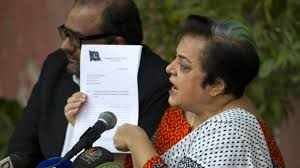
The political party of the former cricket star Imran Khan on Wednesday identified a man it described as the Central Intelligence Agency’s top spy in Pakistan, in an escalation of Mr. Khan’s campaign to end American drone strikes in the country.
In a letter to the Pakistani police, Mr. Khan’s information secretary, Shireen Mazari, accused the C.I.A. director, John O. Brennan, along with a man identified as the agency’s Islamabad station chief, of “committing murder and waging war against Pakistan.”
In Washington, a C.I.A. spokesman declined to comment on the case.
Ms. Mazari demanded that the authorities prevent the station chief, whose identity has not yet been confirmed, from leaving the country so that he can face prosecution in a Pakistani court.
That seems unlikely, but the move is expected to infuriate American officials, who had to recall a previous C.I.A. station chief in 2010 after he was identified in the local news media, also in relation to a legal suit brought by anti-drone campaigners.
But while that outing was blamed on smoldering tensions between the C.I.A. and Pakistan’s Inter-Services Intelligence spy agency, this time it appears to be driven more by Mr. Khan’s increasingly confrontational stance against drone strikes.
In an appearance on a television talk show on Wednesday evening, Mr. Khan said he had named the station chief essentially to punish the C.I.A. for a deadly drone strike this month in the province his P.T.I. party controls, Khyber-Pakhtunkhwa. Now, he said, it was up to Prime Minister Nawaz Sharif’s government to take the next step against the American spy agency.
He has vowed to block NATO supply lines into Afghanistan in retaliation for the Nov. 1 drone strike that killed the leader of the Pakistani Taliban, Hakimullah Mehsud. On Saturday, his supporters moved to deliver on that promise by searching trucks and roughing up drivers as they passed through Khyber-Pakhtunkhwa province on the way to Afghanistan.
In her letter on Wednesday, Ms. Mazari claimed that the station chief did not enjoy diplomatic immunity, and suggested that if interrogated by the police he might divulge the names of the pilots who fly the drones.
The high-profile attempt to obstruct C.I.A. operations in Pakistan was said to be a response to the Nov. 21 drone strike that struck a seminary linked to the Haqqani network, a Taliban-affiliated militant group at the center of American security concerns in Afghanistan. The strike, which killed the Haqqanis’ spiritual leader and five others, occurred in the Hangu district of Khyber-Pakhtunkhwa, in a rare drone strike outside Pakistan’s tribal areas.
Mr. Khan has been a leading advocate of ceasing military action against the Pakistani Taliban, even though Khyber-Pakhtunkhwa has been the region hardest hit by Islamist violence this year, with hundreds killed in attacks. The Taliban also sprung several hundred prisoners to freedom in an embarrassing and well-organized jailbreak in July.
Mr. Khan has used the drone issue to leverage his popularity against Prime Minister Sharif, who is his main electoral competitor in Punjab Province, and indeed has largely succeeded in framing the political debate on drones in recent years.
Some Sharif supporters criticized Mr. Khan for trying to score political points by outing the C.I.A. station chief. “This a thoughtless move,” said Siddiqul Farooq, a central leader of the governing Pakistan Muslim League party. “It is selfish and compromises the national interest.”
Since the escalation of the C.I.A.’s drone war in Pakistan in 2008, the Islamabad station has grown to become one of the spy agency’s largest outposts in the world. The agency’s expansion in Pakistan has been an irritant to America’s relations with Pakistan, with one of the low points coming in January 2011 when an agency contractor, Raymond Davis, shot and killed two men in Lahore.
The influence of the C.I.A.’s Islamabad’s station chief has sometimes eclipsed even that of the American ambassador in Pakistan. A previous station chief clashed repeatedly in 2011 with Cameron Munter, the ambassador at the time, over the intensity of the drone campaign. The Obama administration ended up siding with the C.I.A., and Mr. Munter later resigned.
When the identity of an earlier C.I.A. station chief was made public in 2010, it was also as part of litigation related to the drone campaign. But such court applications are mostly seen as public relations devices, and at the time American officials privately accused the ISI spy agency of a gross breach of trust.
While the C.I.A. station chief discloses his identity to senior Pakistani intelligence officials, he is technically a covert operative and his name is not commonly known in Pakistan or elsewhere.
The C.I.A. did not say whether its station chief would be affected by Wednesday’s action. Similar disclosures in Israel in 1999 and Argentina in 2001 led to the C.I.A. station chiefs in those countries being recalled to the United States.
Reporting was contributed by Salman Masood from Islamabad, Pakistan, and Mark Mazzetti from Washington.
